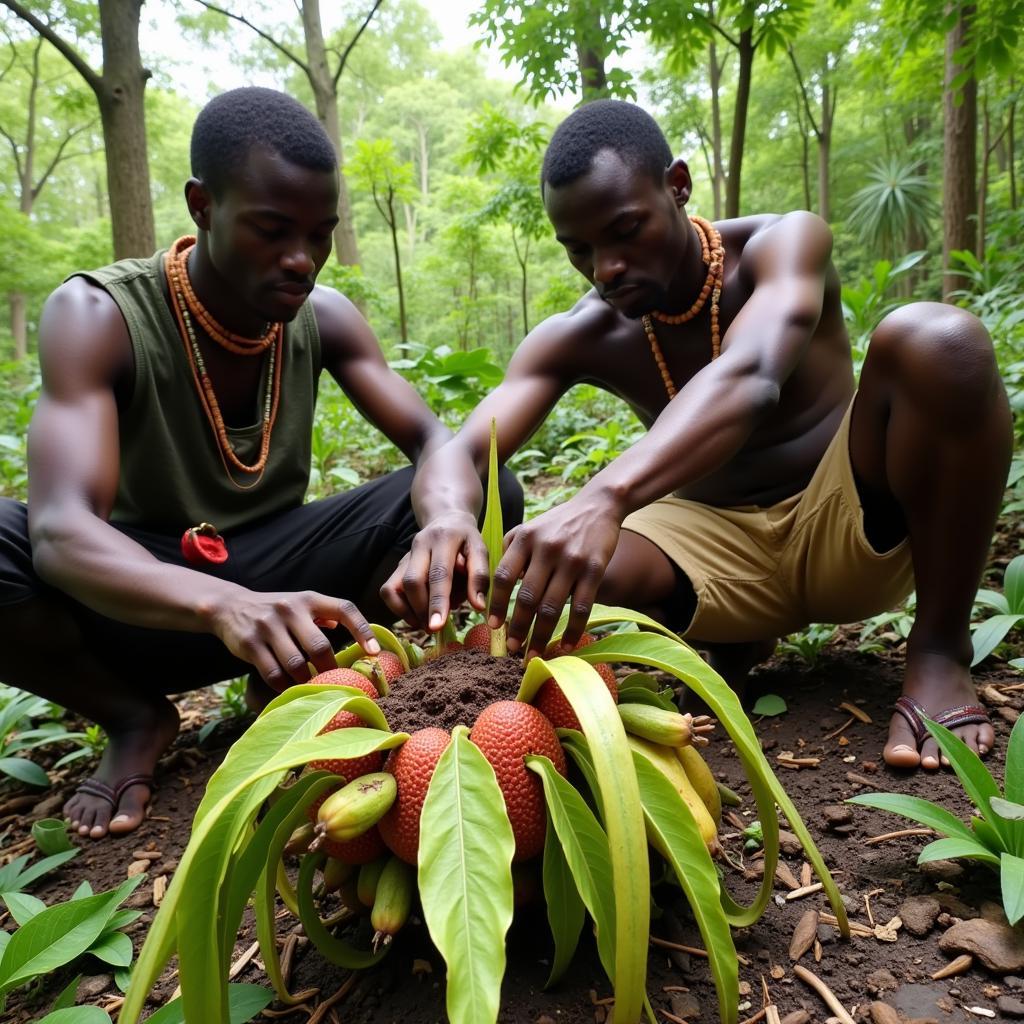10 Herbs Used by African Tribes
For centuries, African tribes have relied on the potent power of herbs for healing, spiritual practices, and daily life. These 10 herbs, passed down through generations, offer a glimpse into the rich ethnobotanical knowledge of the continent. From treating ailments to enhancing rituals, the uses of these plants are as diverse as the tribes themselves. Discover the fascinating world of traditional African medicine and explore the incredible properties of these 10 Herbs That Was Used By African Tribes.
African tribes, deeply connected to their natural surroundings, developed an intricate understanding of the medicinal and practical applications of various plants. This knowledge, often passed down orally through generations, highlights the vital role herbs play in traditional African Life. Let’s delve into the specific uses and cultural significance of 10 remarkable herbs utilized by diverse tribes across the continent.
Unveiling the Healing Power of 10 African Herbs
This section will explore ten powerful herbs used by African tribes, highlighting their traditional uses and potential benefits. From the well-known Rooibos to the lesser-known African Dream Herb, each plant holds a unique place in the rich tapestry of African ethnobotany.
Rooibos (Aspalathus linearis)
Rooibos, a popular South African herbal tea, is known for its antioxidant properties and soothing effects. Tribes have traditionally used it to treat allergies, digestive issues, and skin conditions.
African Wormwood (Artemisia afra)
African wormwood, with its distinctive aroma, is a staple in traditional medicine. Tribes use it to treat fevers, colds, and respiratory ailments, taking advantage of its antiviral and anti-inflammatory properties.
Devil’s Claw (Harpagophytum procumbens)
Devil’s claw, named for its hooked fruit, is revered for its pain-relieving properties. Tribes have traditionally used it to alleviate back pain, arthritis, and other inflammatory conditions.
 Devil's Claw Herb Being Harvested by an African Tribe
Devil's Claw Herb Being Harvested by an African Tribe
African Potato (Hypoxis hemerocallidea)
The African potato, despite its name, is not a true potato. It’s used by tribes to boost the immune system and treat various ailments, including urinary tract infections and prostate problems.
Cancer Bush (Sutherlandia frutescens)
Cancer bush, a vibrant shrub, has been traditionally used to support the immune system and manage symptoms associated with chronic illnesses. It’s important to note that research on its efficacy against cancer is ongoing.
Silene Capensis (African Dream Root)
This plant, revered for its ability to induce vivid and prophetic dreams, plays a significant role in spiritual practices of certain tribes. They believe the dreams offer guidance and insight into the future.
Imphepho (Helichrysum petiolare)
Imphepho, a fragrant herb, is often burned as incense during traditional ceremonies and rituals. It is believed to cleanse the air, ward off evil spirits, and connect with ancestors. Interested in learning more about African tribal traditions? Check out zulu african tribes.
Bulbine (Bulbine frutescens)
Bulbine, with its succulent leaves, is a versatile herb used topically to treat burns, rashes, and other skin irritations. It’s also known for its soothing and moisturizing properties.
Pepper Bark Tree (Warburgia salutaris)
The bark of the pepper bark tree is traditionally used to treat colds, flu, and other infections due to its antibacterial and antifungal properties. It’s also valued for its pain-relieving qualities. Intrigued by African hair care traditions? Explore african himba hair.
African Dream Herb (Entada rheedii)
This fascinating herb, known for its large, flat seeds, is used in traditional medicine to treat various ailments. It’s also known for its purported ability to induce vivid dreams, similar to Silene Capensis. You can learn more about its effects at african dream herb effects.
Conclusion
These 10 herbs represent just a fraction of the vast ethnobotanical knowledge held by African tribes. Their traditional uses highlight the profound connection between these communities and their natural environment. Continuing research on these plants holds immense potential for discovering new therapeutic applications and furthering our understanding of traditional African medicine. Learn more about African bridal traditions by visiting african bride make up. These 10 herbs that was used by african tribes offer valuable insights into the rich heritage of natural remedies.
FAQ
- Are these herbs safe to use? Always consult with a healthcare professional before using any herbal remedies, especially if you are pregnant, breastfeeding, or have pre-existing health conditions.
- Where can I purchase these herbs? Many of these herbs can be found online or in specialized health food stores. Ensure you purchase from reputable sources.
- Are there any scientific studies supporting the traditional uses of these herbs? Research on the efficacy of many traditional African herbs is ongoing. Some herbs have shown promising results in preliminary studies.
- Can these herbs interact with other medications? Yes, herbal remedies can potentially interact with other medications. Consult with a healthcare professional before combining them with any other treatments.
- Are there any sustainable harvesting practices for these herbs? Supporting sustainable harvesting practices is crucial to ensure the long-term availability of these valuable plants. Look for suppliers who prioritize ethical and environmentally friendly practices.
- What other uses do these herbs have besides medicinal purposes? Some of these herbs are used in cooking, cosmetics, and spiritual practices.
- Are there any cultural taboos associated with the use of these herbs? Yes, certain tribes may have specific cultural beliefs and practices associated with the use of certain herbs. Respecting these traditions is important.
For those seeking the best of Africa, explore african best xxx.
Need further assistance? Contact us at Phone Number: +255768904061, Email: [email protected] or visit us at Mbarali DC Mawindi, Kangaga, Tanzania. We have a 24/7 customer service team.

